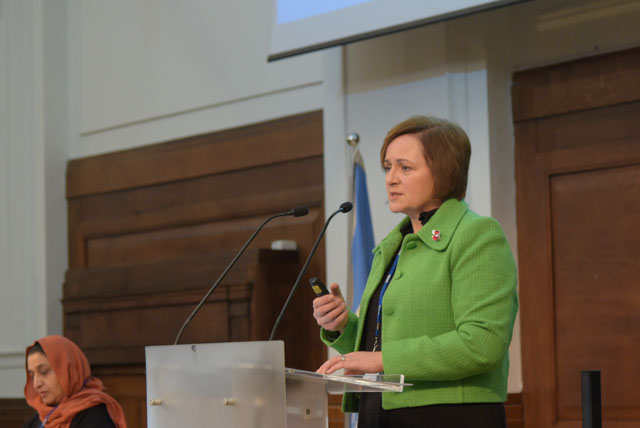Blog by Jill Barnard, SI St Austell and District, South West and Channel Islands
Louisa Rolfe OBE
Assistant Commissioner Frontline Policing, Metropolitan Police Service
Day two of SIGBI Conference began with an emotional session on Women’s Safety and Violence Against Women and Girls.
Louisa Rolfe OBE, opened the morning with a frank presentation on what is happening to reverse the massive breach of trust following the high-profile crimes against women, perpetrated by serving police officers.
Louisa joined the Police Force 32 years ago, with the same personal drive that the majority of police officers join the service for. Joining in the days where, if as a woman, you refused to answer questions on your marriage or child bearing status, you were branded a “feminist”.
She loves her job – but explained she was initially upset when attending domestic violence cases 30 years ago, when, as a newly trained officer, the message to her from more experienced colleagues was, “it’s not our responsibility!”
Louisa clearly thinks differently! She has been the National Police Chief’s Council (NPCC) lead for domestic abuse since 2013, and was the public face of Metropolitan Police Force following the murder of Sarah Everard, by the then serving police officer, Wayne Couzens.
Her ‘day’ job as Assistant Commissioner for Frontline Policing, currently involves policing 32 London boroughs covering all aspects of public protection – safeguarding, rape, human trafficking, to name but a few! This released gasps from the auditorium. However, talking about her national role, Louisa was very clear that she is fully aware that confidence in the Metropolitan Police is far from great, following the recent high-profile cases of officers involved in such horrific crimes, whilst in a position of trust within the community.
There were further gasps from the audience when Louisa announced that investigations into the service has led to approximately 1000 serving officers being questioned over their conduct. Louisa was at pains to state that this number is out of 50,000. But the shocked reaction was palpable.
Louisa acknowledged the need for rapid change and that steps need to be taken to make amends: Change to behaviour and culture within the force is coming about through academic research. Working with Detective Chief Constable Maggie Blyth – NPCC coordinator for tackling Violence Against Women and Girls across policing, as well as Chief Constable Sarah Crew from Avon and Somerset Police.
This research showed that ‘trauma fatigue’ experienced by many officers leads to lack of empathy with the victim, and because of this, investigations need desperately to move from focussing on the victims account, to a more ‘trauma informed’ approach. Since the recognition of this fact and it being addressed through training there have been 500 more rape cases to CPS than last year.
Louisa spoke about the introduction of the initiative SafeLives, a training course for frontline domestic abuse practitioners, providing training so far to 7000 police officers in London, where it is hoped much of the bias and misogyny within such cases will be eradicated.
Louisa’s experience as a police officer has, on the whole been positive – the majority of officers join for the right reason. There is a small minority, however who use this position of trust as a Power status – we need to root this out and address bias within the police and support the leadership to challenge poor behaviour – Currently the Police Force seem to be spending more time apologising rather than celebrating success.
60% Response Police Officers attending domestic violence cases have less than 3 year’s experience – they cannot be experts in everything and as such there is increased pressure on the force. Far from making excuses – Louisa was purely making a point that there has to be support out there for the Police officers, addressing the perpetrators need through mental health, drug and housing support provision.
There have been recent successes: Non-fatal strangulation has been recognised as a form of coercive control and no longer classed as common assault. With medical involvement there has now been an increase in prosecution.
Things are changing but there is so much more to do:
The current Justice system is very inefficient. It now takes 5 times more work for investigating officers to achieve CPS approval and as courts currently have a backlog of 30,000 cases it is taking 2 years for such cases to get to court… As you can imagine, more gasps!
Louisa was though, at pains to state that justice is only part of the problem – just the start of the journey – we need to start working together more and recognise that, as a woman, 1 in 4 of us will be subject to domestic abuse during our lives. We were made to think that within the room we were all surrounded by women who have experienced such violence. We need to recognise and act on this fact.
So what can we do…one thing is to ensure as a society – we are more likely to report incidents and to familiarise ourselves with the Suzy Lamplugh Trust “Stand Up Against Harassment, Bystander Training” in order to recognise concerning behaviour before it escalates and to promote a societal responsibility to Violence against Women and Girls


